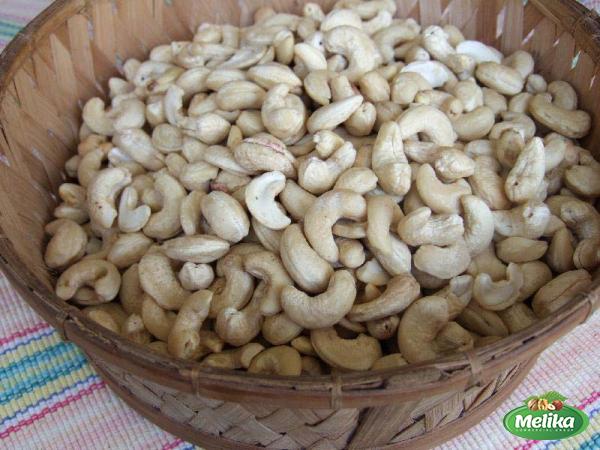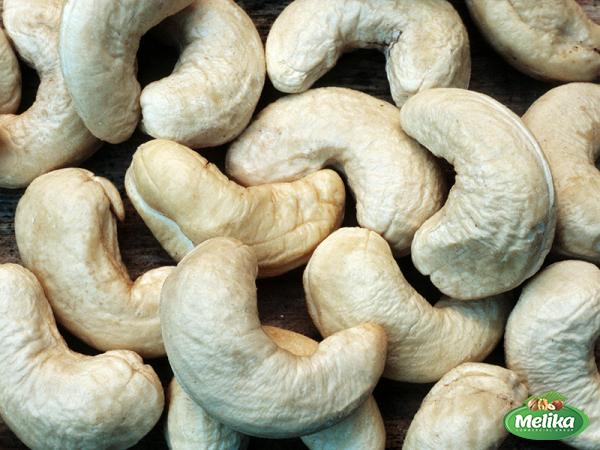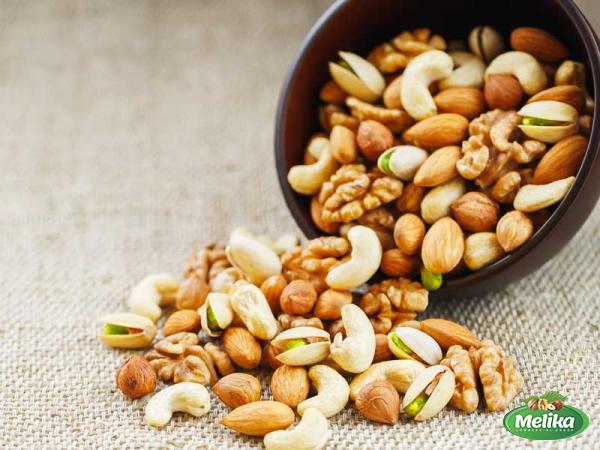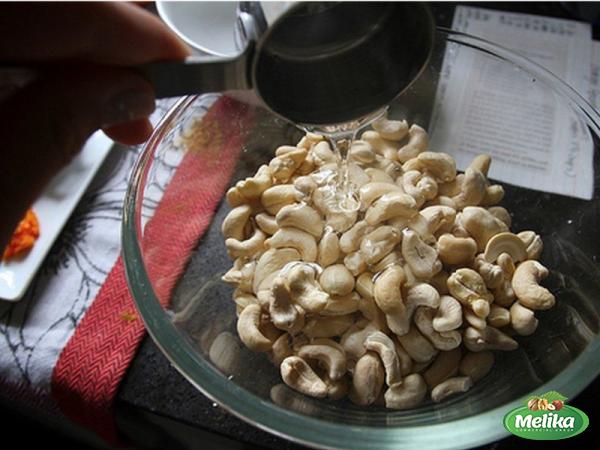Raw cashews are a highly popular and sought-after product in the global market. Cashew nuts, scientifically known as Anacardium occidentale, are native to Brazil but are now primarily cultivated in many tropical countries, including India, Vietnam, Nigeria, and Ivory Coast. Cashews are known for their rich and buttery flavor, nutritional content, and versatility in various culinary applications. When it comes to purchasing raw cashews in bulk, there are several factors to consider. Bulk purchases of raw cashews are often made by businesses such as food manufacturers, retailers, restaurants, and wholesalers. These bulk purchases are typically done to meet the demand for both the domestic and international markets. In this summary, we will explore the significance of raw cashews in bulk, their sourcing, processing, market trends, and potential benefits. Sourcing of Raw Cashews: Cashew trees grow in regions with warm climates, and their cultivation requires specific environmental conditions. Today, countries like Vietnam and India are leading producers of cashews, followed by Nigeria, Ivory Coast, and Brazil. Each country’s cashew production has distinct characteristics, including quality, taste, and yield. Businesses that buy raw cashews in bulk often evaluate various sourcing options to ensure high-quality and cost-effective products. Processing of Raw Cashews: Raw cashews go through a series of processing steps to convert them into edible kernels. Initially, the cashews are harvested and separated from the apples that surround them. Following this, the nuts are cleaned, graded, and dried to remove excess moisture.

nuts
 Once dried, the cashews are shelled to obtain the kernels. Shelling can be done through manual labor or mechanized processes, depending on the scale of operations. Finally, the cashew kernels undergo further processing such as roasting, salting, and flavoring, depending on the intended use. Market Trends and Demand: The global demand for cashews has been steadily increasing over the years, driven by factors such as population growth, rising consumer awareness about healthy snacking options, and the versatility of cashews in various culinary applications. The demand for raw cashews in bulk is primarily fueled by the food manufacturing sector, which uses cashews as ingredients in products like snack bars, confectioneries, nut butter, and plant-based milk alternatives. Additionally, the retail sector plays a significant role in catering to growing consumer demand for healthy and convenient snacking options. Benefits of Raw Cashews: Raw cashews offer a range of nutritional benefits and are considered a healthy addition to one’s diet. They are a good source of protein, healthy fats, vitamins, and minerals. Cashews are also rich in antioxidants, which help combat oxidative stress and inflammation in the body. Moreover, cashews are naturally cholesterol-free and contain dietary fiber, making them suitable for individuals seeking heart-healthy and digestive-friendly foods. Their versatility allows for various uses, including snacking, cooking, baking, and garnishing. Benefits of Buying Raw Cashews in Bulk: Buying raw cashews in bulk offers several advantages for businesses, including cost savings, consistent availability, and the ability to maintain quality control. Purchasing in bulk allows businesses to negotiate better prices and secure a steady supply of raw cashews, reducing the risk of stockouts. Additionally, buying in larger quantities enables businesses to streamline their operations and optimize packaging and distribution costs. Bulk purchasing also gives businesses more control over the quality of the raw cashews, as they can work closely with suppliers to ensure adherence to desired standards. Challenges in the Raw Cashew Bulk Market: While the raw cashew bulk market presents numerous opportunities, there are also challenges that businesses need to navigate. One such challenge is the volatility of cashew prices, which can be influenced by factors such as climate change, crop diseases, geopolitical factors, and currency fluctuations. Businesses must carefully monitor these factors and develop strategies to mitigate risks associated with price fluctuations. Additionally, ensuring the ethical sourcing of raw cashews, including fair trade practices and sustainable farming methods, is becoming increasingly important to consumers and can be a challenge for businesses in the cashew market. Conclusion: Raw cashews in bulk offer numerous benefits and opportunities for businesses operating in the food manufacturing, retail, and wholesale sectors. The demand for raw cashews continues to grow due to their nutritional value, versatile applications, and increasing consumer preference for healthy and convenient snacks. However, businesses must carefully evaluate sourcing options, maintain quality control, navigate price volatility, and prioritize sustainable and ethical practices to succeed in the competitive raw cashew bulk market.
Once dried, the cashews are shelled to obtain the kernels. Shelling can be done through manual labor or mechanized processes, depending on the scale of operations. Finally, the cashew kernels undergo further processing such as roasting, salting, and flavoring, depending on the intended use. Market Trends and Demand: The global demand for cashews has been steadily increasing over the years, driven by factors such as population growth, rising consumer awareness about healthy snacking options, and the versatility of cashews in various culinary applications. The demand for raw cashews in bulk is primarily fueled by the food manufacturing sector, which uses cashews as ingredients in products like snack bars, confectioneries, nut butter, and plant-based milk alternatives. Additionally, the retail sector plays a significant role in catering to growing consumer demand for healthy and convenient snacking options. Benefits of Raw Cashews: Raw cashews offer a range of nutritional benefits and are considered a healthy addition to one’s diet. They are a good source of protein, healthy fats, vitamins, and minerals. Cashews are also rich in antioxidants, which help combat oxidative stress and inflammation in the body. Moreover, cashews are naturally cholesterol-free and contain dietary fiber, making them suitable for individuals seeking heart-healthy and digestive-friendly foods. Their versatility allows for various uses, including snacking, cooking, baking, and garnishing. Benefits of Buying Raw Cashews in Bulk: Buying raw cashews in bulk offers several advantages for businesses, including cost savings, consistent availability, and the ability to maintain quality control. Purchasing in bulk allows businesses to negotiate better prices and secure a steady supply of raw cashews, reducing the risk of stockouts. Additionally, buying in larger quantities enables businesses to streamline their operations and optimize packaging and distribution costs. Bulk purchasing also gives businesses more control over the quality of the raw cashews, as they can work closely with suppliers to ensure adherence to desired standards. Challenges in the Raw Cashew Bulk Market: While the raw cashew bulk market presents numerous opportunities, there are also challenges that businesses need to navigate. One such challenge is the volatility of cashew prices, which can be influenced by factors such as climate change, crop diseases, geopolitical factors, and currency fluctuations. Businesses must carefully monitor these factors and develop strategies to mitigate risks associated with price fluctuations. Additionally, ensuring the ethical sourcing of raw cashews, including fair trade practices and sustainable farming methods, is becoming increasingly important to consumers and can be a challenge for businesses in the cashew market. Conclusion: Raw cashews in bulk offer numerous benefits and opportunities for businesses operating in the food manufacturing, retail, and wholesale sectors. The demand for raw cashews continues to grow due to their nutritional value, versatile applications, and increasing consumer preference for healthy and convenient snacks. However, businesses must carefully evaluate sourcing options, maintain quality control, navigate price volatility, and prioritize sustainable and ethical practices to succeed in the competitive raw cashew bulk market.
Specifications of nuts
 With their rich flavor, nutritional content, and versatility, raw cashews are in high demand across the globe. In this article, we will delve deeper into the business aspects of raw cashews in bulk, exploring the sourcing process, processing methods, market trends, and potential benefits for businesses. Whether you are a food manufacturer, retailer, wholesaler, or restaurant owner, understanding the dynamics of the raw cashew industry can help you make informed decisions and capitalize on this growing market. 1. Sourcing Raw Cashews in Bulk: Sourcing raw cashews in bulk is a crucial step for businesses to ensure a consistent supply of high-quality nuts. Cashew trees thrive in warm climates, making countries like Vietnam, India, Nigeria, Ivory Coast, and Brazil major cashew producers. Businesses need to evaluate various sourcing options based on factors such as quality, taste, yield, and cost-effectiveness. Developing relationships with reliable suppliers and exploring direct trade opportunities can help businesses guarantee a steady and reliable supply chain of raw cashews. 2. Processing Raw Cashews: Raw cashews undergo a series of processing steps to transform them into edible kernels. Initially, cashews are harvested and separated from the apples that surround them. The nuts are then cleaned, graded, and dried to remove excess moisture. After drying, cashews are shelled to obtain the kernels. Shelling can be achieved manually or through mechanized processes depending on the scale of operations. Finally, the cashew kernels can be further processed with roasting, salting, or flavoring, depending on the desired end product. 3. Market Trends and Demand: The global demand for cashews has been on a steady rise, driven by factors such as population growth, increasing consumer awareness of healthy snacking options, and the versatility of cashews in various culinary applications. Businesses that purchase raw cashews in bulk find a significant demand from the food manufacturing sector, where these nuts are used for making snack bars, confectioneries, nut butter, and plant-based milk alternatives. Moreover, the retail sector plays a major role in catering to the growing consumer demand for healthy and convenient snacking options. 4. Nutritional Benefits of Raw Cashews: Raw cashews offer a range of nutritional benefits, making them a healthy addition to one’s diet. They are an excellent source of protein, healthy fats, vitamins, and minerals. Cashews are also rich in antioxidants, which help combat oxidative stress and inflammation in the body. Furthermore, being naturally cholesterol-free and high in dietary fiber, cashews are suitable for individuals seeking heart-healthy and digestive-friendly foods. Their versatility allows for various uses, including snacking, cooking, baking, and garnishing. 5. Benefits of Buying Raw Cashews in Bulk: Businesses that opt to purchase raw cashews in bulk can enjoy several advantages, including cost savings, consistent availability, and quality control. Buying in bulk allows businesses to negotiate better prices, secure a steady supply of raw cashews, and reduce the risk of stockouts. Moreover, purchasing in larger quantities enables businesses to streamline their operations and optimize packaging and distribution costs. With bulk purchasing, businesses can closely monitor and maintain quality standards, working closely with suppliers to ensure adherence to desired quality parameters.
With their rich flavor, nutritional content, and versatility, raw cashews are in high demand across the globe. In this article, we will delve deeper into the business aspects of raw cashews in bulk, exploring the sourcing process, processing methods, market trends, and potential benefits for businesses. Whether you are a food manufacturer, retailer, wholesaler, or restaurant owner, understanding the dynamics of the raw cashew industry can help you make informed decisions and capitalize on this growing market. 1. Sourcing Raw Cashews in Bulk: Sourcing raw cashews in bulk is a crucial step for businesses to ensure a consistent supply of high-quality nuts. Cashew trees thrive in warm climates, making countries like Vietnam, India, Nigeria, Ivory Coast, and Brazil major cashew producers. Businesses need to evaluate various sourcing options based on factors such as quality, taste, yield, and cost-effectiveness. Developing relationships with reliable suppliers and exploring direct trade opportunities can help businesses guarantee a steady and reliable supply chain of raw cashews. 2. Processing Raw Cashews: Raw cashews undergo a series of processing steps to transform them into edible kernels. Initially, cashews are harvested and separated from the apples that surround them. The nuts are then cleaned, graded, and dried to remove excess moisture. After drying, cashews are shelled to obtain the kernels. Shelling can be achieved manually or through mechanized processes depending on the scale of operations. Finally, the cashew kernels can be further processed with roasting, salting, or flavoring, depending on the desired end product. 3. Market Trends and Demand: The global demand for cashews has been on a steady rise, driven by factors such as population growth, increasing consumer awareness of healthy snacking options, and the versatility of cashews in various culinary applications. Businesses that purchase raw cashews in bulk find a significant demand from the food manufacturing sector, where these nuts are used for making snack bars, confectioneries, nut butter, and plant-based milk alternatives. Moreover, the retail sector plays a major role in catering to the growing consumer demand for healthy and convenient snacking options. 4. Nutritional Benefits of Raw Cashews: Raw cashews offer a range of nutritional benefits, making them a healthy addition to one’s diet. They are an excellent source of protein, healthy fats, vitamins, and minerals. Cashews are also rich in antioxidants, which help combat oxidative stress and inflammation in the body. Furthermore, being naturally cholesterol-free and high in dietary fiber, cashews are suitable for individuals seeking heart-healthy and digestive-friendly foods. Their versatility allows for various uses, including snacking, cooking, baking, and garnishing. 5. Benefits of Buying Raw Cashews in Bulk: Businesses that opt to purchase raw cashews in bulk can enjoy several advantages, including cost savings, consistent availability, and quality control. Buying in bulk allows businesses to negotiate better prices, secure a steady supply of raw cashews, and reduce the risk of stockouts. Moreover, purchasing in larger quantities enables businesses to streamline their operations and optimize packaging and distribution costs. With bulk purchasing, businesses can closely monitor and maintain quality standards, working closely with suppliers to ensure adherence to desired quality parameters.
buy nuts
 6. Challenges in the Raw Cashew Bulk Market: While the raw cashew bulk market presents numerous opportunities, businesses also face certain challenges that need to be carefully navigated. One of the primary challenges is the volatility of cashew prices, which can be influenced by factors such as climate change, crop diseases, geopolitical factors, and currency fluctuations. To mitigate risks associated with price fluctuations, businesses must closely monitor market trends and develop strategies, including hedging mechanisms, to protect their profit margins. Additionally, ensuring ethical sourcing practices, including fair trade and sustainability, is essential to gain consumer trust and maintain a positive brand image. 7. Potential Value-Added Products: Businesses that purchase raw cashews in bulk can explore opportunities to diversify their product offerings and create value-added products. For example, they can develop unique flavor profiles by experimenting with different roasting techniques or introduce coated cashews with various coatings such as chocolate or spices. Additionally, businesses can develop cashew-based products like cashew milk, cashew butters, or even cashew flour for gluten-free baking. By utilizing the versatility of raw cashews, businesses can tap into niche markets and cater to a wider range of consumer preferences. 8. Export Opportunities in the Raw Cashew Market: The raw cashew market offers significant export opportunities for businesses. Many countries have a growing demand for raw cashews, and businesses can capitalize on this by exporting to international markets. By complying with international quality and certification standards and understanding import requirements, businesses can establish themselves as reliable suppliers of raw cashews in bulk globally. Developing strong relationships with importers, distributors, and trade associations can help businesses navigate the complexities of international trade. 9. Sustainability and Responsible Sourcing: In recent years, there has been a growing emphasis on sustainability and responsible sourcing in the cashew industry. Consumers are increasingly concerned about the environmental and social impact of their purchases. Businesses that prioritize sustainable farming practices, fair trade, and ethical sourcing can differentiate themselves and attract conscious consumers. Certifications like Fairtrade, Rainforest Alliance, and Organic are not only a mark of credibility but also ensure adherence to strict sustainability standards. 10. Marketing and Branding Strategies: To succeed in the raw cashew industry, businesses need to develop effective marketing and branding strategies. This includes creating a strong brand identity, communicating the nutritional benefits and versatility of raw cashews, and targeting the right customer segments. Utilizing various marketing channels such as social media, online platforms, trade shows, and industry publications can help businesses reach a wider audience and build brand visibility and trust. Conclusion: Raw cashews in bulk present a lucrative opportunity for businesses in the food industry. Sourcing high-quality cashews, implementing efficient processing methods, monitoring market trends, and capitalizing on the nutritional benefits and versatility of cashews are key factors in establishing a successful business in the raw cashew bulk market. By understanding the dynamics, challenges, and opportunities of this growing industry, businesses can strategically position themselves to meet the demand for raw cashews and establish long-term success.
6. Challenges in the Raw Cashew Bulk Market: While the raw cashew bulk market presents numerous opportunities, businesses also face certain challenges that need to be carefully navigated. One of the primary challenges is the volatility of cashew prices, which can be influenced by factors such as climate change, crop diseases, geopolitical factors, and currency fluctuations. To mitigate risks associated with price fluctuations, businesses must closely monitor market trends and develop strategies, including hedging mechanisms, to protect their profit margins. Additionally, ensuring ethical sourcing practices, including fair trade and sustainability, is essential to gain consumer trust and maintain a positive brand image. 7. Potential Value-Added Products: Businesses that purchase raw cashews in bulk can explore opportunities to diversify their product offerings and create value-added products. For example, they can develop unique flavor profiles by experimenting with different roasting techniques or introduce coated cashews with various coatings such as chocolate or spices. Additionally, businesses can develop cashew-based products like cashew milk, cashew butters, or even cashew flour for gluten-free baking. By utilizing the versatility of raw cashews, businesses can tap into niche markets and cater to a wider range of consumer preferences. 8. Export Opportunities in the Raw Cashew Market: The raw cashew market offers significant export opportunities for businesses. Many countries have a growing demand for raw cashews, and businesses can capitalize on this by exporting to international markets. By complying with international quality and certification standards and understanding import requirements, businesses can establish themselves as reliable suppliers of raw cashews in bulk globally. Developing strong relationships with importers, distributors, and trade associations can help businesses navigate the complexities of international trade. 9. Sustainability and Responsible Sourcing: In recent years, there has been a growing emphasis on sustainability and responsible sourcing in the cashew industry. Consumers are increasingly concerned about the environmental and social impact of their purchases. Businesses that prioritize sustainable farming practices, fair trade, and ethical sourcing can differentiate themselves and attract conscious consumers. Certifications like Fairtrade, Rainforest Alliance, and Organic are not only a mark of credibility but also ensure adherence to strict sustainability standards. 10. Marketing and Branding Strategies: To succeed in the raw cashew industry, businesses need to develop effective marketing and branding strategies. This includes creating a strong brand identity, communicating the nutritional benefits and versatility of raw cashews, and targeting the right customer segments. Utilizing various marketing channels such as social media, online platforms, trade shows, and industry publications can help businesses reach a wider audience and build brand visibility and trust. Conclusion: Raw cashews in bulk present a lucrative opportunity for businesses in the food industry. Sourcing high-quality cashews, implementing efficient processing methods, monitoring market trends, and capitalizing on the nutritional benefits and versatility of cashews are key factors in establishing a successful business in the raw cashew bulk market. By understanding the dynamics, challenges, and opportunities of this growing industry, businesses can strategically position themselves to meet the demand for raw cashews and establish long-term success.











Your comment submitted.